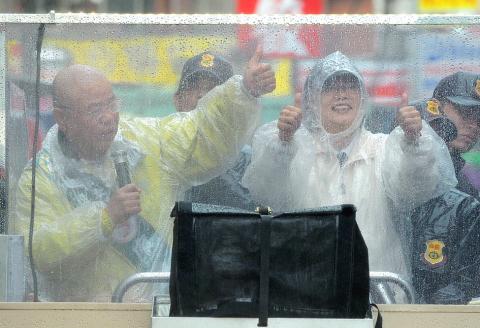Democratic Progressive Party (DPP) presidential candidate Tsai Ing-wen (蔡英文) said in an interview with the New York Times published yesterday that her China policy has been consistent through the years — one that does not accept the “one China” principle and advocates bilateral engagement with a democratic process and under a multilateral framework.
The DPP chairperson said that a “Taiwan consensus,” based on majority opinion through open dialogue, is a better way to deal with China than the opaque -decision-making process used by the Chinese Nationalist Party (KMT) for decades.
The so-called “1992 consensus” has been advocated by President Ma Ying-jeou (馬英九), her opponent in next Saturday’s presidential election, and Beijing because China has insisted on it as a precondition for any cross-strait exchanges.

Photo: Wang Yi-sung, Taipei Times
The 1992 consensus “is messy and nobody has a clear idea or convincing argument as to what happened in the 1990s,” she said.
Tsai said that the Taiwan consensus “means people in Taiwan have to get together and form a consensus of their own and that they would then turn around and talk to the Chinese to form a cross-strait consensus so we can build a relationship on that consensus.”
“And in my view, that is the right order to do things. And with that, we can build a long-lasting relationship with China,” she said.
Taiwan needs to manage uncertainty in dealing with China, a rising power that “is not a democracy or a full market economy yet,” to make sure it could insulate itself from problems such as social instability China may be facing, she said.
Taiwan appears to have lost its sovereignty because more international partners think Taiwan has accepted the “one China” principle and Ma’s interpretation of the cross-strait relationship as an “area-to-area relationship,” Tsai said.
Her China policy has been “pretty consistent” since she served as minister of the Mainland Affairs Council, Tsai said, as she said that Taiwan should leave its options open, but the important decisions have to made by the people through a democratic process.
“I do think we need to normalize our trade and economic relationship [with China] in the multilateral framework of the WTO. That continues to be my position,” she said.
Tsai raised several points about the development of Taiwan’s democracy, saying the bright side is that there are more mature voters and citizens, but there has been increasing Chinese influence as well.
The KMT’s large party assets continued to hurt fair competition between political parties, she added.
She said she was not worried about the US abandoning Taiwan, because Taiwan was not facing China alone and if the US is serious about returning to the Asia-Pacific region, it should boost the confidence of all the countries in the region.
The presidential hopeful said that former president Chen Shui-bian’s (陳水扁) corruption case did not reflect on the DPP, adding that it is the KMT that still has prevalent and systemic corruption.
On economic issues, she highlighted the need for job creation and a change of strategy because Taiwan needs to pursue an employment-driven economy, instead of a GDP-driven one, and change the economy from one based on cost to one based on technology and innovation.

ANOTHER EMERGES: The CWA yesterday said this year’s fourth storm of the typhoon season had formed in the South China Sea, but was not expected to affect Taiwan Tropical Storm Gaemi has intensified slightly as it heads toward Taiwan, where it is expected to affect the country in the coming days, the Central Weather Administration (CWA) said yesterday. As of 8am yesterday, the 120km-radius storm was 800km southeast of Oluanpi (鵝鑾鼻), Taiwan’s southernmost tip, moving at 9kph northwest, the agency said. A sea warning for Gaemi could be issued tonight at the earliest, it said, adding that the storm is projected to be closest to Taiwan on Wednesday or Thursday. Gaemi’s potential effect on Taiwan remains unclear, as that would depend on its direction, radius and intensity, forecasters said. Former Weather Forecast

As COVID-19 cases in Japan have been increasing for 10 consecutive weeks, people should get vaccinated before visiting the nation, the Centers for Disease Control (CDC) said. The centers reported 773 hospitalizations and 124 deaths related to COVID-19 in Taiwan last week. CDC Epidemic Intelligence Center Director Guo Hung-wei (郭宏偉) on Tuesday said the number of weekly COVID-19 cases reported in Japan has been increasing since mid-May and surpassed 55,000 cases from July 8 to July 14. The average number of COVID-19 patients at Japan’s healthcare facilities that week was also 1.39 times that of the week before and KP.3 is the dominant

The Chinese Communist Party’s (CCP) working group for Taiwan-related policies is likely to be upgraded to a committee-level body, a report commissioned by the Mainland Affairs Council (MAC) said. As Chinese President Xi Jinping (習近平) is increasingly likely to upgrade the CCP’s Central Leading Group for Taiwan Affairs, Taiwanese authorities should prepare by researching Xi and the CCP, the report said. At the third plenary session of the 20th Central Committee of the CCP, which ended on Thursday last week, the party set a target of 2029 for the completion of some tasks, meaning that Xi is likely preparing to

US-CHINA TRADE DISPUTE: Despite Beijing’s offer of preferential treatment, the lure of China has dimmed as Taiwanese and international investors move out Japan and the US have become the favored destinations for Taiwanese graduates as China’s attraction has waned over the years, the Ministry of Labor said. According to the ministry’s latest income and employment advisory published this month, 3,215 Taiwanese university graduates from the class of 2020 went to Japan, surpassing for the first time the 2,881 graduates who went to China. A total of 2,300 graduates from the class of 2021 went to the US, compared with the 2,262 who went to China, the document showed. The trend continued for the class of 2023, of whom 1,460 went to Japan, 1,334 went to